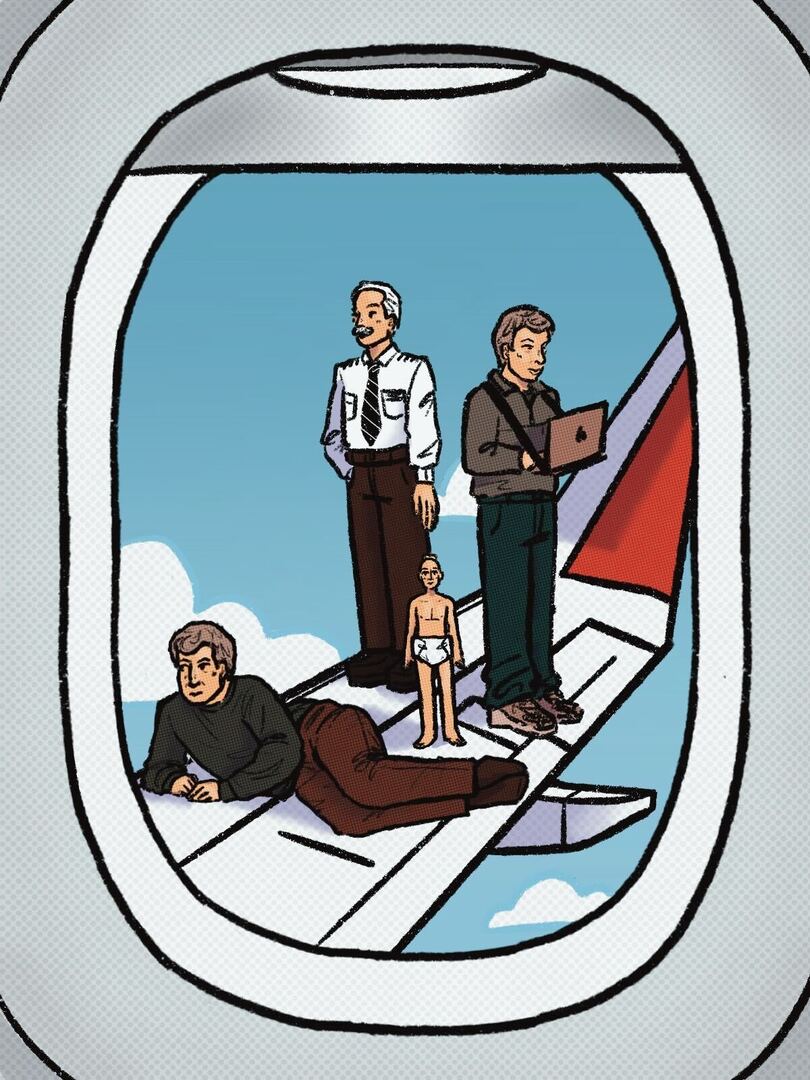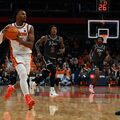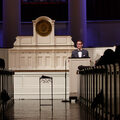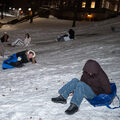‘The Rehearsal’ combines aviation safety study with in-flight entertainment

Fly above your travel anxiety with Nathan Fielder at the helm. Our columnist argues that season 2 of “The Rehearsal” blurs the line between scientific experiment, personal hyperfixation and endlessly creative entertainment. Sarah Yudichak | Contributing Illustrator
Get the latest Syracuse news delivered right to your inbox.
Subscribe to our newsletter here.
Six Sunday nights in a row, I sat on my couch at 10:30 p.m. ready to watch the new episodes of Nathan Fielder’s “The Rehearsal.” I never knew where the show was going. There’s usually predictability baked into TV shows — you can tell what the show is building toward.
That certainly wasn’t the case with “The Rehearsal.” My mouth hung agape as Fielder, Canada’s greatest comedic export, wore a diaper and breastfed from a giant puppet in the name of commercial aviation safety in its third episode.
Let’s back up a little bit.
Season two of “The Rehearsal,” which started airing on April 20 and ended on Sunday, defies explanation. Writing about it is insurmountable, and won’t capture the experience of sitting down and watching six episodes of Fielder’s documentary-comedy hybrid. Do yourself a favor and watch it.
Fielder’s classic 2010s Comedy Central show, “Nathan For You,” was built on a simple premise: giving real small business owners intentionally terrible business ideas for comedic effect. “The Rehearsal” deals with real people once again, creating elaborate “rehearsals” of real life circumstances to prepare them for the unexpected in advance.
I can’t emphasize enough how important it is that this is a documentary with real people. Fielder draws humor from the weirdness of the average American — in season two, he deals with actors, pilots, plane salesmen and government officials.
The first season dealt extensively with parenthood, becoming sociologically and psychologically complex in the process, garnering praise for its creativity. And while Fielder is opaque about his intent, members of the neurodivergent community complimented the show on its portrayal of “masking.”
The new season of “The Rehearsal” is about Fielder trying to use his show to solve commercial aviation disasters. He met with John Goglia, a former member of the National Transportation Safety Board, and presented a case study suggesting a lack of communication in the cockpit contributes to plane crashes, or at least a high risk of them. Fielder argues this is a massive issue that no one’s discussing.
He decides to set up elaborate scenarios, or rehearsals, to test pilot communication issues. He then works with actors using his “Fielder Method,” and puts them into the simulated reality. The goal is to interpret what someone might do in advance of a simple interaction, and then prepare for every possible scenario. He’s basically a wizard with a crystal ball.
Does that explain the basic premise? Good. It’s only going to get stranger from here. Buckle up and enjoy the in-flight entertainment.
Fielder’s research, if you take it seriously, is dependent on HBO’s budget. The elaborate sets, massive cast of extras and constant camera footage are all funded by HBO. Fielder said the network gave him “a blank check,” so long as what he makes is entertaining.
But it’s equally fair to say Fielder is making a joke of his research, which is instead some artistic or comedic statement, because his experiments are absurd.
Fielder had pilots act as reality TV show judges rejecting talent to assess their ability to break difficult news to people. He tests something called “The Pack” — a crowd of actors surrounding a pilot and parroting their words to help develop the pilot’s confidence.
These experiments are pretty ridiculous, and Fielder’s background isn’t in social science research. HBO wants the show to be entertaining, of course, so we shouldn’t take these at face value. But who knows? The people involved in these experiments do seem to benefit from his strange research.

Nathan Fielder was certified as a commercial pilot for the new season of “The Rehearsal.” Our columnist argues the show’s commitment to ridiculous but real stunts is part of its appeal.
Courtesy of the FAA Airman Registry
Reality is a toy to Fielder. He understands that when dealing with real people, they’ll often act in strange ways independent of manipulation — like the pilot who said he’s been banned from Hinge, Bumble and Tinder for not “walking on eggshells” around women. The same pilot also, unironically, said he wanted to beef up on his “español” to pick up “Latina women.”
One episode of the show explores nature vs. nurture and how it can influence a pilot’s psychology. Fielder studies how a pilot’s upbringing might influence their decision making in crises. But like the rest of the show, it isn’t your typical case study.
Famed pilot Chesley “Sully” Sullenberger made a key decision in the cockpit in the Hudson River landing — he asked his co-pilot for advice. Fielder’s research suggests this level of communication is unusual. Fielder’s theory? If pilots went through Sully’s upbringing, theoretically, they would be able to tap into his decision-making skills in crisis situations.
So, Fielder takes it to a comedic extreme, going to the beginning of Sully’s life. He dresses as a baby in a diaper. He relives Sully’s high school crush. None of this is necessary for the experiment, but Fielder isn’t really a scientist anyway. The point of “The Rehearsal” is primarily entertainment — but Fielder’s testing the limits of reality TV.
Key junctures of Sully’s memoir play out as Fielder recrafts Sully’s lived experience to learn how he became a skilled communicator. Fielder discovers, though, that Sully’s memoir is incomplete — when confronting major hurdles, the memoir is vague as to how Sully dealt with his emotions in the moment.
Pilots in the show mention to Fielder they’re often withdrawn from their emotions, since it could cause them to lose their medical clearance from the Federal Aviation Administration and ground them due to mental health risks. Fielder believes this is part of why Sully is so vague about his emotions after his father’s death.
As much as “The Rehearsal” gets a laugh for its ridiculousness, there is genius poking through it. The show explores the anxiety of preparing for the unexpected, as Fielder himself frequently confronts his own anxiety while advocating for a greater understanding of pilot’s mental health.
Episode five gets to the thematic heart of the show, and discusses at length how the show’s premise relates to neurodivergence. Fielder holds the viewers at arm’s length regarding his own experience — it’s implied that he might have autism himself, as he gets a fMRI in the season finale but refuses to share the results with viewers.
I can’t reveal the entire ending before you get there, because you have to see it to believe it. But here’s a hint: Fielder is himself a licensed commercial pilot as of Feb. 20, 2025, according to the FAA Airmen Registry.
Perhaps the key to unlocking the Fielder’s puzzle lies in episode three, right before one of the more peculiar scenes of the show.
“After all, this wasn’t a performance for the viewer,” Fielder said during the Sully experiments. “It was an experience for me.”
Maybe all along, “The Rehearsal” is probing the limits of conventional entertainment. The show’s budget goes to these elaborate experiments, entirely serving Fielder’s own hyperfixation on aviation.
Who benefits more? Fielder, who gets to live his dreams of being a pilot and, potentially, influencing Congress and the public to take him more seriously as a thought leader? Or us, shocked and awed by what he pulls off week to week?
I can’t answer that. But I will be seated on my couch weekly for season three.






